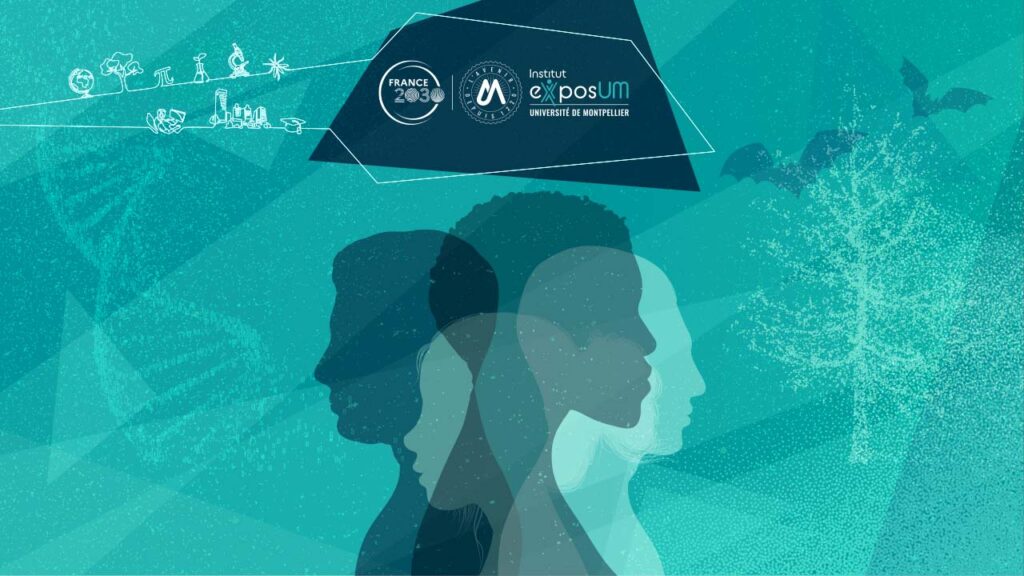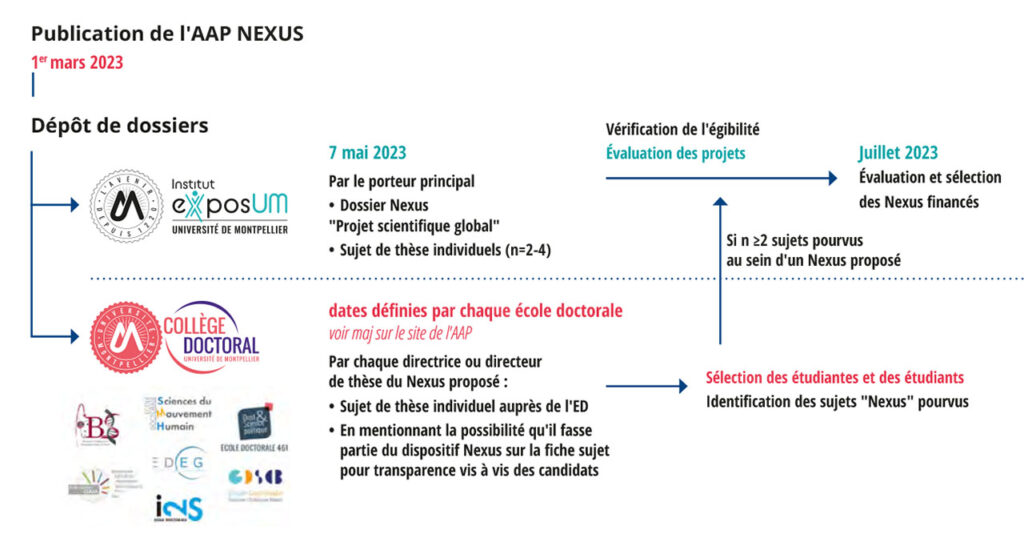Call for projects Formation 2023 Institut ExposUM Doctoral Nexus
ExposUM is an initiative of the University of Montpellier and its partners1 aimed at establishing an out-of-building, decompartmentalized reference institute for the study, training and interaction between science and society, on the environmental determinants of human health. Winner of the ExcellenceS call for projects (PIA4) and supported by the Occitanie Region, ExposUM is funded to the tune of 46.4 M€ over the period 2022-2030.

Scientific scope
The exposome is the set of environmental and social factors the effects of which, combined with the intrinsic characteristics of individuals, underlie the onset, the evolution, and the severity of infectious or non-communicable human diseases. In this sense, it is the environmental counterpart of the genome, with which it interacts throughout the life of individuals.
Background and objective
The training component of the Institut ExposUM aims to :
- Decompartmentalize training (interdisciplinarity).
- Contribute to skills enhancement.
- Greater integration of links with developing countries.
To this end, several actions will be organized, including the funding of doctoral contracts as part of a program that structures them into interdisciplinary networks, hereinafter referred to as the Doctoral Nexus.
The Doctoral Nexus are networks of 3 to 42 doctoral students and doctoral students, from different disciplines (e.g. Social Sciences - Mathematical Modeling - Biology), and affiliated to at least two different research units. They will be funded on the basis of :
- a joint research project, drawn up by the principal investigator in collaboration with the thesis supervisors involved, encompassing all disciplines, and aimed at studying one or more aspects of the exposome as defined above,
- an individual, disciplinarythesis topic for each doctoral student involved.
Each thesis will be funded from the outset for a period of four years. This extra year is justified by the need to set up specific training programs and allocate more time to interdisciplinarity. In particular, exchanges between laboratories will be encouraged.
The ExposUM Institute's doctoral promotions will be strengthened by the introduction of an additional joint teaching program focusing on methodology and the acquisition of skills, in particular interdisciplinarity and transdisciplinarity, run within the framework of the ExposUM Institute, without replacing the training courses organized by the doctoral schools. As part of this program, network doctoral students will be tasked withorganizing a one-dayconference (both scientific and logistical) during their third
year. They will receive a grant from the Institute for this purpose.
The Institute will therefore organize an annual Doctoral Nexus call for projects (AAP) with the UM Doctoral Schools, using ANR and Région Occitanie funds.
For the 2023 campaign, the Institute proposes to allocate a maximum of 15 grants
(e.g. 5 Nexus projects, each comprising 3 theses).
This funding covers the salaries of doctoral students (approximately 167 k€ over 4 years) as well as environmental costs. These include the costs of additional training courses organized by the Institute, including the seminar, and operating expenses. The operating budget is allocated in its entirety to the project leader, who coordinates its distribution within the Nexus, i.e. around 60 k€ for a Nexus of 3 doctoral students or 80 k€ for a Nexus of 4 doctoral students (around 20 k€/doctoraldoctoral student).
Eligibility criteria
- The main sponsor must be affiliated with a UR, UMR or UMI.3 that is part of the ExposUM consortium. UAR, UExp, UPS, US4in particular
may not apply for this AAP.5. - The project must involve collaboration between at least two different research units.
- Proposed theses must last 4 years.
- doctoral students must be registered at the University of Montpellier, and their thesis directors must be affiliated to one of the UM doctoral schools mentioned in this call for proposals.6.
- The project must aim to produce knowledge relating to the exposome - i.e., any determinant of human health of environmental origin in the broadest sense.
Selection criteria (indicative)
- Original interdisciplinarity relevant to the subject: the involvement of different doctoral schools in a network will be encouraged,
- Methodological skills,
- Impact potential (both fundamental and applied),
- Feasibility (scientific and financial environment already in place to ensure successful completion of the thesis),
- Coordinating individual projects,
- Relevance to Institut ExposUM's strategic priorities (initiating new partnerships, One Health approach, Global Health and the South, promoting the involvement of the Humanities and Social Sciences).
How to submit
The project must be written in French or English, using the simplified application form (see below) and following the instructions given therein.
Submission of applications by the main sponsor on the following website: https://exposumnexus.sciencesconf.org/
Security mail with [AAP Doctoral Nexus] in the subject line.
Before May 7, 2023, 4pm CET.
Support for the integration of human and social sciences
If Nexus candidates would like support in
integrating the Humanities and Social Sciences into their Nexus, Axis 2 of
l'Institut ExposUM, and its manager Aurélie Binot, offer support/
incubation.
You can request this support by sending an e-mail (subject: [Nexus SHS]).
Selection procedure
As the implementation of a Nexus is conditional on the identification of a doctoral student for each thesis topic, the selection of students will be carried out in parallel with the evaluation of the scientific quality of the projects.
In compliance with the University of Montpellier's HRS4R label, the selection of doctoral students students will be carried out by the doctoral schools, with publication of the proposed topics in advance. In all cases, we recommend that teams that have identified potential doctoral students on Nexus topics encourage
them to apply via the corresponding EDs.
The procedures for the selection of doctoral students by the Doctoral Schools, as well as their respective timetables, will be specified as soon as they have been validated internally by the Doctoral Schools on the AAP website, on the page "Procedures specific to the Doctoral Schools". Depending on the Doctoral School, selection may be made either through the Doctoral School's joint competition, particularly if the planned timetable is compatible with the present AAP, or
through a dedicated procedure.
The main sponsor is therefore invited to :
- Submit a dossier (see Submission procedure) to the ExposUM Institute to apply for the Nexus program,
- Submit each individual thesis subject to the ED to which it belongs, indicating briefly whether the thesis is eligible for the Nexus scheme.
The Nexus project evaluation committee will be made up of representatives of the COSS of the ExposUM Institute and representatives of the EDs, and will assess the scientific quality of the projects as a whole (cf. Selection criteria). This evaluation will be carried out in a single stage on the basis of the dossier submitted to the ExposUM Institute.
In a second phase, subject to candidates being ranked by the EDs on at least 2 thesis topics in a Nexus project, the final selection for funding will then be made by COSS, taking into account the Institute's strategic orientations, the completeness of the Nexus and the qualities of the doctoral students selected.

Calendar
- March 1, 2023
Publication AAP Doctoral Nexus Wave 1 - March 21, 2023
Opening of the deposit platform - May 7, 2023
Deadline for receipt of projects - July 2023
Announcement of results - September-November 2023
Start of theses
Commitments
Applicants undertake to organize regular meetings (at least 3 times a year) with Nexus thesis directors and doctoral students doctoral students , and to provide the Institute with an annual report on their activities.
Selected project sponsors undertake to include the France 2030, Université de Montpellier and Région Occitanie logos in all communications arising from the project, and to comply with the University of Montpellier's publications signature charter.
Research structures in the ExposUM consortium7
ABSYS, AGAP, AIDA, ALYENA, AMAP, ANALYSES, ART-Dev, ASTRE, BC2M, BCM, BioWooEB, BPMP, CBGP, CBS, CDE, CEE-M, CEFE, CEMIPAI, CEPEL, CERCOP, ChimEco, CRBM, CREAM, DEFE, DGIMI, DIADE, DIASCOPE, DMEM, ECO&SOLS, ECOTRON, EDSM, EDPFM, ESPACE-DEV, EuroMov DHM, Forêts et Sociétés, G-EAU, GECO, Génopolys, GM, HortSys, HSM, IATE, IBMM, ICGM, ICSM, IDEDH, IDESP, IEM, IES, IGF, IGH, IGMM, IHD, IHPE, IMAG, IMAGINE, INM, INNOVATION, INTERTRYP, IRCM, IRIM, IRMB, ISDM, ISEM,
ITAP, L2C, LBE, LBN, LDP, LEPSE, LICeM, LIRDEF, LIRMM, LISAH, LMGC, LPHI, LSTM, LUPM, MARBEC, MISTEA, MIVEGEC, MMDN, MOISA, MRE, MRM, MSH Sud, OREME, PCCEI, Pech Rouge, PHIM, PhyMedExp, QualiSud, Recyclage et Risque, SantESiH, SELMET, SENS, SPO, Sys2Diag, TETIS, TransVIHMI, Vassal, VBIC
Contact
For information on this call for projects, please send an e-mail (subject: [Contact Nexus]).
Institut ExposUM governance
- Management Committee (CoDir) : Éric Delaporte (dir.), Aurélie Binot, Charlotte Boullé, Mircea Sofonea.
- Project manager: Élodie Suttling
- Conseil Scientifique et d'Orientation Stratégie (COSS) : Jacques Mercier (pres.), Amaria Baghdadli, Bernadette Bensaude-Vincent, Pascal Demoly, Delphine Destoumieux-Garzon, Didier Fontenille, Sylvain Gandon, Julie Pannequin, Denis Pesche, Éric Servat, Coumba Toure Kane, Muriel Vayssier-Taussat, Laurent Visier.
- Conseil d'Orientation et d'Évaluation de la Research (COER) : Charlotte Boullé, Anca Mirela Chiriac, Constance Delaby, Jacques Gardon, Alexandre Hobeika, Clément Jonquet, Antonio Maraver, Mircea Sofonea, Annelise Tran.
Results
Nexus 2023 AAP winners:
| Acronym | Title | Carrier | UMR |
| POLLHEART | Air pollution and pulmonary emphysema impact hemodynamic cardiovascular properties. POLLHEART | Bourdin Arnaud | PhyMedExp |
| TEDxPUM | Exploring the chemical exposome's impact on amyloid assembly | Cottet Herve | IBMM |
| MATRIX2 | External exposome in a polluted environment related to extractive industry: different modelling strategies | Cadot Emmanuelle | HSM |
| I-CARE | ImpaCt de l'Anthropisation sur le Risque d'Emergence d'arboviroses zoonotiques en Afrique Centrale. Acronym (I-CARE) | Paupy Christophe | MIVEGEC |
| EZFE | ExpoZone FE | Visier Laurent | CEPEL |
- Cirad, CNRS, Ifremer, Inrae, Inria, Inserm, IRD, ENSCM, Institut Agro, CHU Montpellier, ICM, Région Occitanie. ︎
- By way of derogation for this first edition of the AAP, and in cases where this is duly justified by the particularly innovative nature of a collaboration, the network may be composed of only two thesis subjects. ︎
- Unité de Research, Unité Mixte de Research, Unité Mixte Internationale. ︎
- Research Support Unit, Experimental Unit, Own Service Unit, Service Unit. ︎
- The research structures [UR, UMR, UMI, UAR, UExp, UPS and US] of the ExposUM Institute consortium are listed on page 5 of this document. ︎
- U ED 166 Information Structures Systèmes [I2S], ED 168 Sciences Chimiques et Biologiques pour la Santé [CBS2], ED 231 Economie Gestion [EDEG], ED 459 Sciences Chimiques Balard [SCB], ED 461 Droit et science politique [DSP], ED 463 Sciences Mouvement Humain [SMH], ED 584 GAIA (Biodiversity, Agriculture, Food, Environment, Earth, Water). ︎
- As a reminder, only URs, UMRs and UMIs can apply to this AAP.
UARs, UExp, USs and UPSs are not eligible. ︎